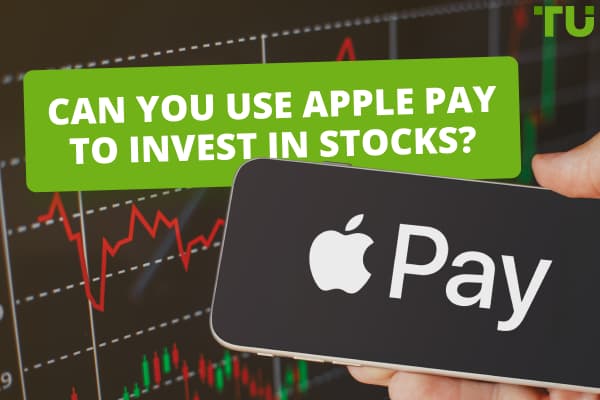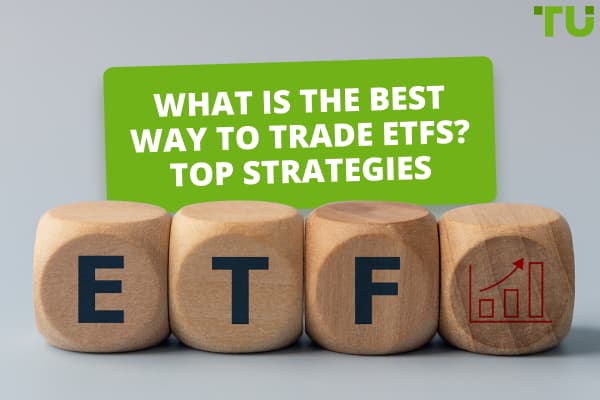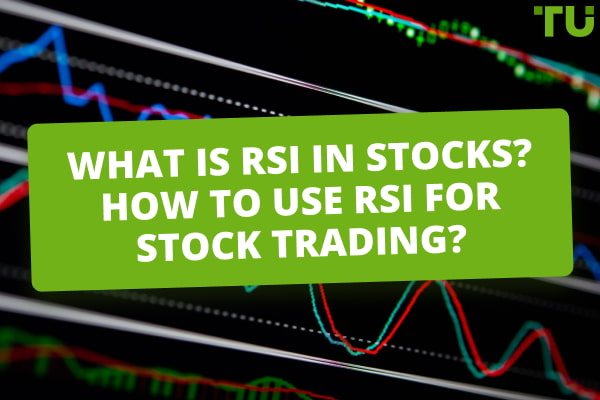Top Hydrogen ETF To Buy For Long-Term
The best green hydrogen ETFs to invest in are
-
1
L&G Hydrogen Economy UCITS ETF
-
2
VanEck Hydrogen Economy UCITS ETF
-
3
Global X Hydrogen ETF
-
4
Amundi Global Hydrogen ESG Screened UCITS ETF
-
5
Direxion Hydrogen ETF
-
6
Defiance Next Gen H2 ETF
-
7
Invesco Hydrogen Economy UCITS ETF
As the world seeks innovative solutions to combat climate change, green hydrogen technology has emerged as one of the few alternatives showing remarkable potential. In fact, Hydrogen ETFs have provided a convenient and diversified option for investors looking to participate in this green energy revolution. In this article, the experts will help you understand the top ETFs that grant access to this sector. These funds offer the potential for significant growth and a chance to be part of the global transition to cleaner and more sustainable energy sources. By the end of the article, you will get the idea whether hydrogen ETFs are for you or not.
Start investing in ETFs now with eToro!What are Hydrogen ETFs
A Hydrogen ETF is an exchange-traded fund designed to give investors exposure to companies involved in the hydrogen industry. These ETFs concentrate on businesses engaged in various aspects of the hydrogen sector, including production, distribution, and application. They typically hold a portfolio of stocks, allowing investors to diversify their investments across multiple companies related to hydrogen.
Hydrogen ETFs play a crucial role in diversified investment portfolios by offering exposure to a niche sector. It offers exposure to the growing hydrogen industry and makes it an attractive option for those looking to align their investments with sustainable and renewable energy trends. Hydrogen ETFs also offer the potential for long-term growth in this sector as countries and industries increasingly turn to hydrogen solutions.
Top Hydrogen ETFs to Consider
| Name of ETF | Ticker | Expense Ratio | AUM | Index Tracked |
|---|---|---|---|---|
|
L&G Hydrogen Economy UCITS ETF |
HTWO |
0.49% |
$431M |
Solactive Hydrogen Economy Index |
|
VanEck Hydrogen Economy UCITS ETF |
HDRO (LSE) |
0.55% |
$103.7M |
MVIS Global Hydrogen Economy Index |
|
Global X Hydrogen ETF |
HYDR |
0.50% |
$37.6M |
Solactive Global Hydrogen Index |
|
Amundi Global Hydrogen ESG Screened UCITS ETF |
ANRJ |
0.45% |
$34.08M |
Bloomberg Hydrogen ESG Index |
|
Direxion Hydrogen ETF |
HJEN |
0.45% |
$26.2M |
Indxx Hydrogen Economy Index |
|
Defiance Next Gen H2 ETF |
HDRO (NYSE) |
0.30% |
$24.65M |
BlueStar Hydrogen & NextGen Fuel Cell Index |
|
Invesco Hydrogen Economy UCITS ETF |
HYDE |
0.60% |
$2.12M |
WilderHill Hydrogen Economy Index |
L&G Hydrogen Economy UCITS ETF (Ticker: HTWO)
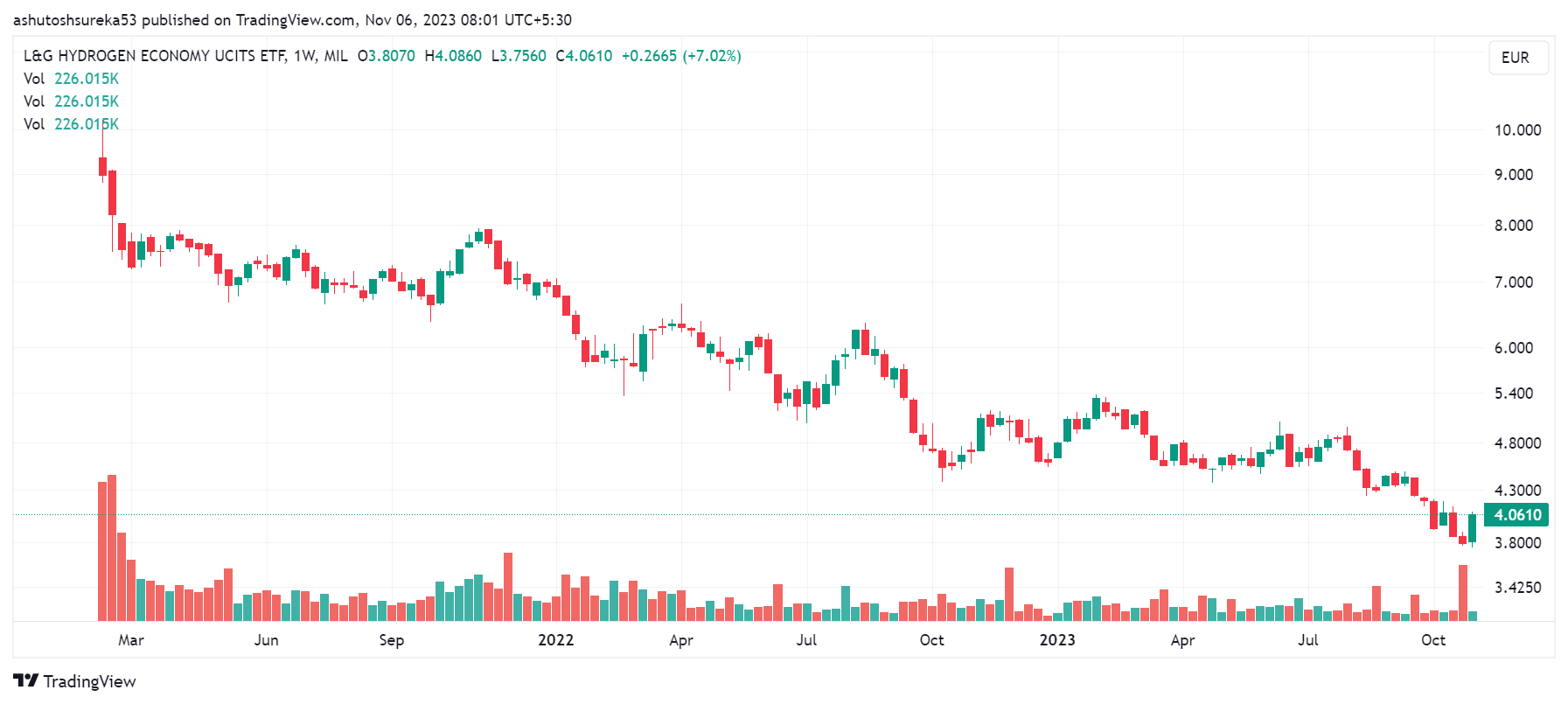
Expert insight: The L&G Hydrogen Economy UCITS ETF boasts net assets of $454.7M, a NAV of 4.22, a PE ratio of 0.11, and operates with an expense ratio of 0.49%.Though the price trend has been on a continuous downtrend since inception, the prospects of the industry must be considered to take a comprehensive view of the ETF.
| Sr. No. | Components | Weights |
|---|---|---|
|
1 |
Taiyo Nippon Sanso Corp |
8.61% |
|
2 |
Toyota Motor Corp |
7.60% |
|
3 |
Lin |
5.99% |
|
4 |
Weichai Power Co Ltd Cny 1.0 |
5.89% |
|
5 |
Kyocera Corp |
5.75% |
|
6 |
Air Products & Chemicals |
5.56% |
|
7 |
Cummins Inc |
5.44% |
|
8 |
Air Liquide |
5.43% |
|
9 |
Hyundai Motor Co Krw 5000.0 |
4.98% |
|
10 |
Chemours Co Usd 0.01 |
4.96% |
|
11 |
Ballard Power Systems Inc |
4.65% |
|
12 |
Johnson Matthey |
4.40% |
|
13 |
Plug Pwr Inc Usd 0.01 |
4.11% |
|
14 |
Fuelcell Energy Inc |
3.73% |
|
15 |
Others (14 constituents) |
22.90% |
This ETF primarily invests in companies that span the hydrogen value chain, including those engaged in hydrogen production, storage, transportation, and utilization. Additionally, it is also one of the biggest hydrogen ETF with an AUM of $431M. The managers of HTWO follow full replication method, mainly by tracking Solactive Hydrogen Economy Index.
However, investors should be mindful of the fact that this fund may have underlying investments that are valued in currencies that are different from the currency of its share class. In this case, exchange rate fluctuations can impact the value of your investment.
VanEck Hydrogen Economy UCITS ETF (Ticker: HDRO)
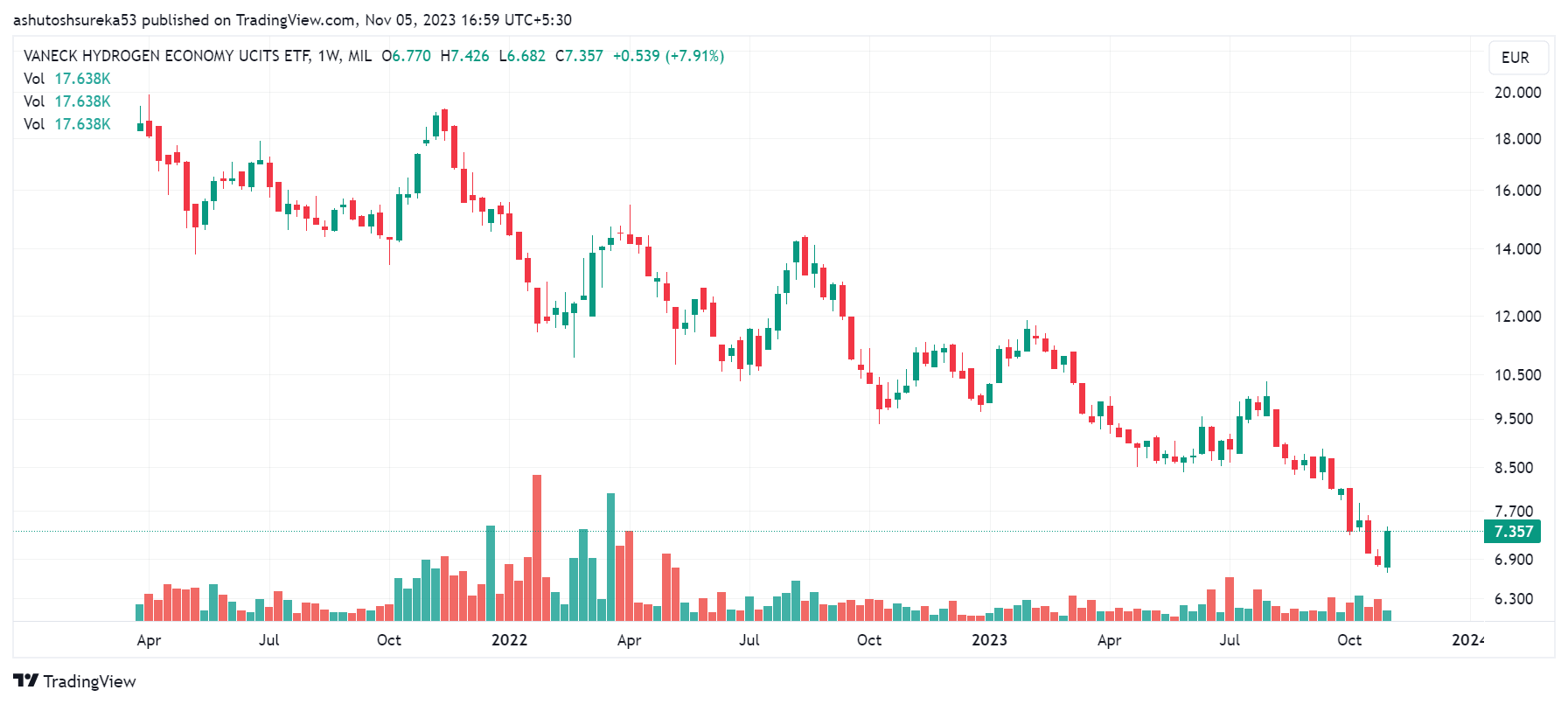
Expert insight: VanEck Hydrogen Economy UCITS ETF stands with total net assets of $87.6 million, featuring a net asset value (NAV) of $7.86. The fund operates with a total expense ratio of 0.55%. Though the price trend has been on a continuous downtrend since inception, the prospects of the industry must be considered to take a comprehensive view of the ETF.
| Sr. No. | Components | Weights |
|---|---|---|
|
1 |
Plug Power Inc |
9.70% |
|
2 |
Bloom Energy Corp |
9.47% |
|
3 |
Mitsubishi Chemical Holdings Corp |
8.91% |
|
4 |
Nel Asa |
8.46% |
|
5 |
Linde Plc |
8.38% |
|
6 |
Air Products And Chemicals Inc |
8.34% |
|
7 |
Air Liquide Sa |
8.28% |
|
8 |
Nikola Corp |
7.27% |
|
9 |
Ballard Power Systems Inc |
6.63% |
|
10 |
Doosan Fuel Cell Co Ltd |
4.11% |
This ETF aims to track MVIS Global Hydrogen Economy Index through physical full replication process. It has low tracking error, as the returns of the fund for the year 2022 differ by 0.2% with the returns of the benchmark index.
The portfolio composition of the fund consists of stocks and cash with no exposure to any debt instruments. In stocks, the fund has around 39% exposure to large-cap (>$5B market cap), around 29% exposure to mid-cap ($1B - $5B market cap), and around 32% exposure to small-cap (<$1B market cap). This signifies that the fund is almost equally distributed to different strata of stocks. However, this fund experiences currency risk as returns may increase or decrease because of currency fluctuations.
Global X Hydrogen ETF (Ticker: HYDR)
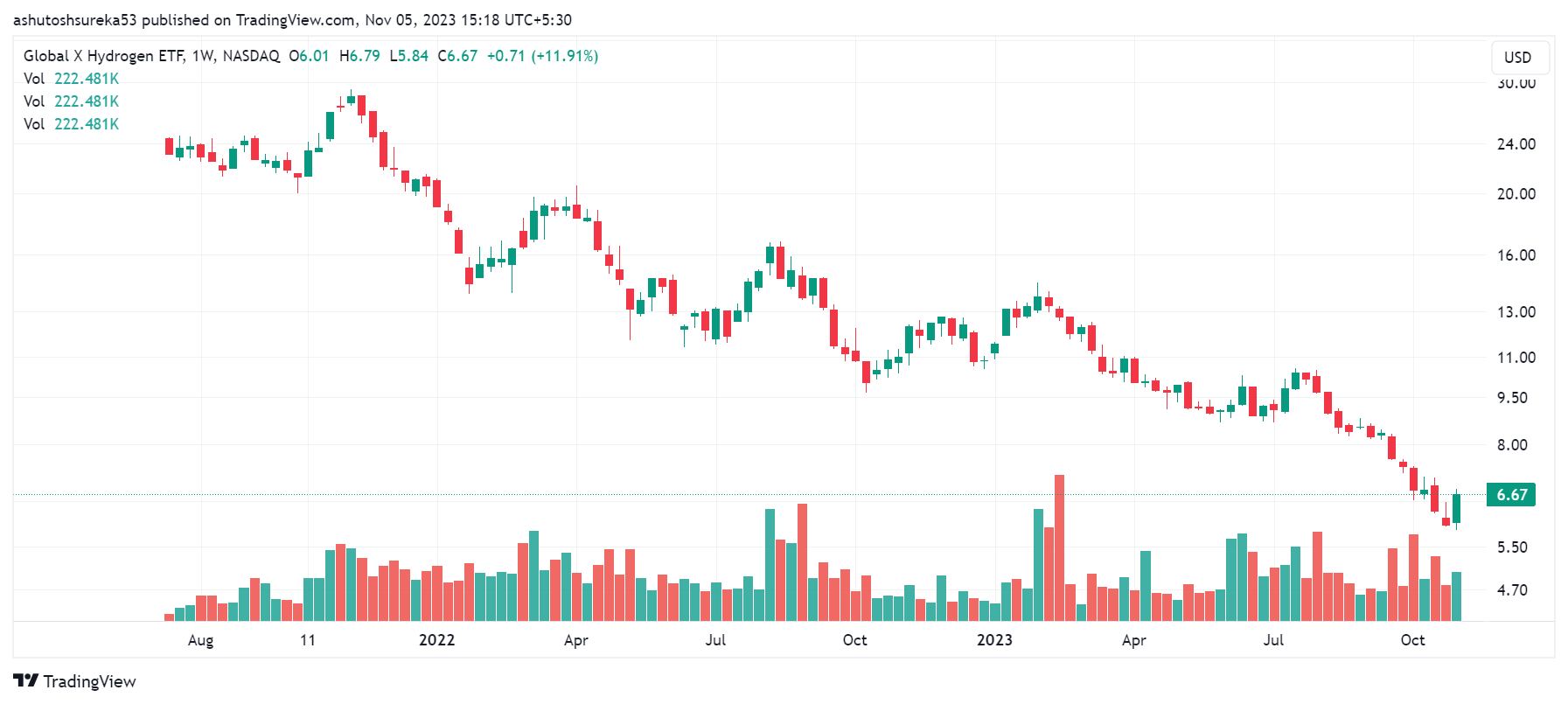
Expert insight: The Global X Hydrogen ETF showcases net assets amounting to $32.2M, a NAV of 6.36, and operates with an expense ratio of 0.50%. Though the price trend has been on a continuous downtrend since inception, the prospects of the industry must be considered to take a comprehensive view of the ETF.
| Sr. No. | Components | Weights |
|---|---|---|
|
1 |
Plug Power Inc |
13.30% |
|
2 |
Bloom Energy Corp- A |
12.65% |
|
3 |
Ballard Power Systems Inc |
9.41% |
|
4 |
Nel Asa |
9.38% |
|
5 |
Itm Power Plc |
5.82% |
|
6 |
Sfc Energy Ag-Br |
4.90% |
|
7 |
Ceres Power Holdings Plc |
4.17% |
|
8 |
Afc Energy Plc |
3.60% |
|
9 |
Doosan Fuel Cell Co Ltd |
3.55% |
|
10 |
Toyota Motor Corp |
3.52% |
|
11 |
Powercell Sweden Ab |
3.29% |
|
12 |
Fuelcell Energy Inc |
3.21% |
|
13 |
Hyzon Motors Inc |
3.03% |
|
14 |
Linde Plc |
2.89% |
|
15 |
Others (12 constituents) |
17.29% |
This ETF also invests in companies which operate in the hydrogen value chain, storage, transportation, and utilization. Though their move towards sustainable energy is not limited to one sector or location. HYDR's investments reflect this by offering global exposure across various industries. This fund’s inception date is 12th August, 2021 which makes it new to the market and consequently giving it a limited proven track record. However, the future prospect of the fund looks promising depending on the overall growth of the hydrogen industry.
Amundi Global Hydrogen ESG Screened UCITS ETF (Ticker: ANRJ)
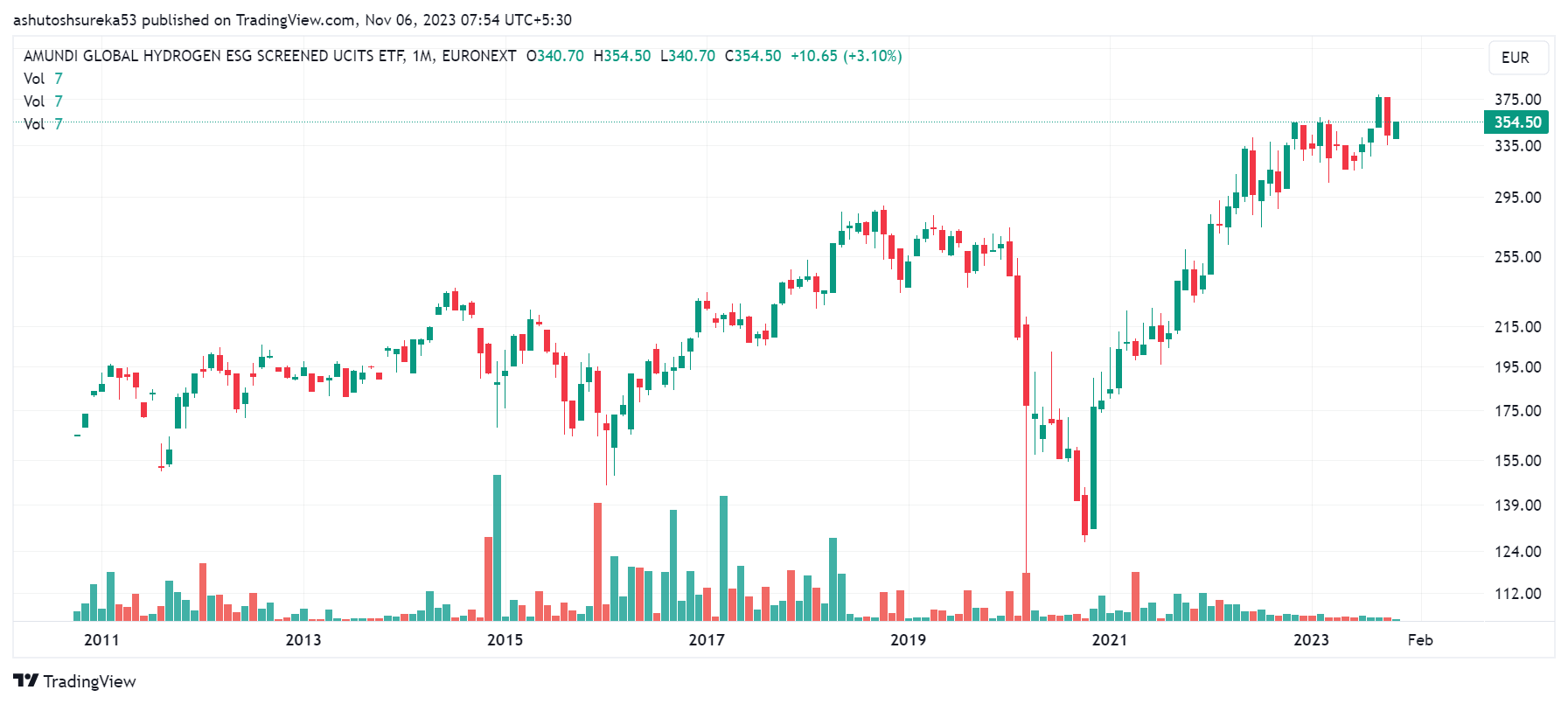
| Sr. No. | Components | Weights |
|---|---|---|
|
1 |
Air Products Chemicals |
5.84% |
|
2 |
Engie |
5.77% |
|
3 |
Linde Plc |
5.76% |
|
4 |
Air Liquide Sa |
5.70% |
|
5 |
Mitsubishi Hvy Ind Jpy50 |
5.54% |
|
6 |
Iberdrola Sa |
5.40% |
|
7 |
Cummins Inc |
5.35% |
|
8 |
Lg Chem Ltd |
4.61% |
|
9 |
Orsted A/S |
3.46% |
|
10 |
Sungrow Power Supply Co Lt-A |
3.31% |
|
11 |
Yara International Asa |
3.03% |
|
12 |
Norsk Hydro Asa Nok20 |
3.00% |
|
13 |
Toyota Motor Corp |
2.96% |
|
14 |
Ssab Ab-A Shares |
2.85% |
|
15 |
Others (27 constituents) |
37.44% |
The Amundi Global Hydrogen ESG Screened UCITS ETF holds a NAV of 353.70 with net assets totalling $31.77M. This ETF aims to promote sustainable and responsible investment practices by employing ESG screening. It offers a diversified approach to gain exposure to the hydrogen sector and aims to closely replicate the performance of Bloomberg Hydrogen ESG Index in USD.
The maximum tracking error objective between the growth of the net asset value of the Fund and that of the Index is 2%, which is on the higher end when compared to other industry players. Also, investors may remain exposed to currency risk between the currencies of the equities that make up the index and the currency of the Fund. However, they will not be exposed to the currency risk between the currency of the index and the currency of the fund. So why is this ETF a part of this list, even after these negative observations? Well, because even though the entire industry is currently experiencing a downtrend, this ETF has been outperforming, potentially on the back of prospects.
Direxion Hydrogen ETF (Ticker: HJEN)
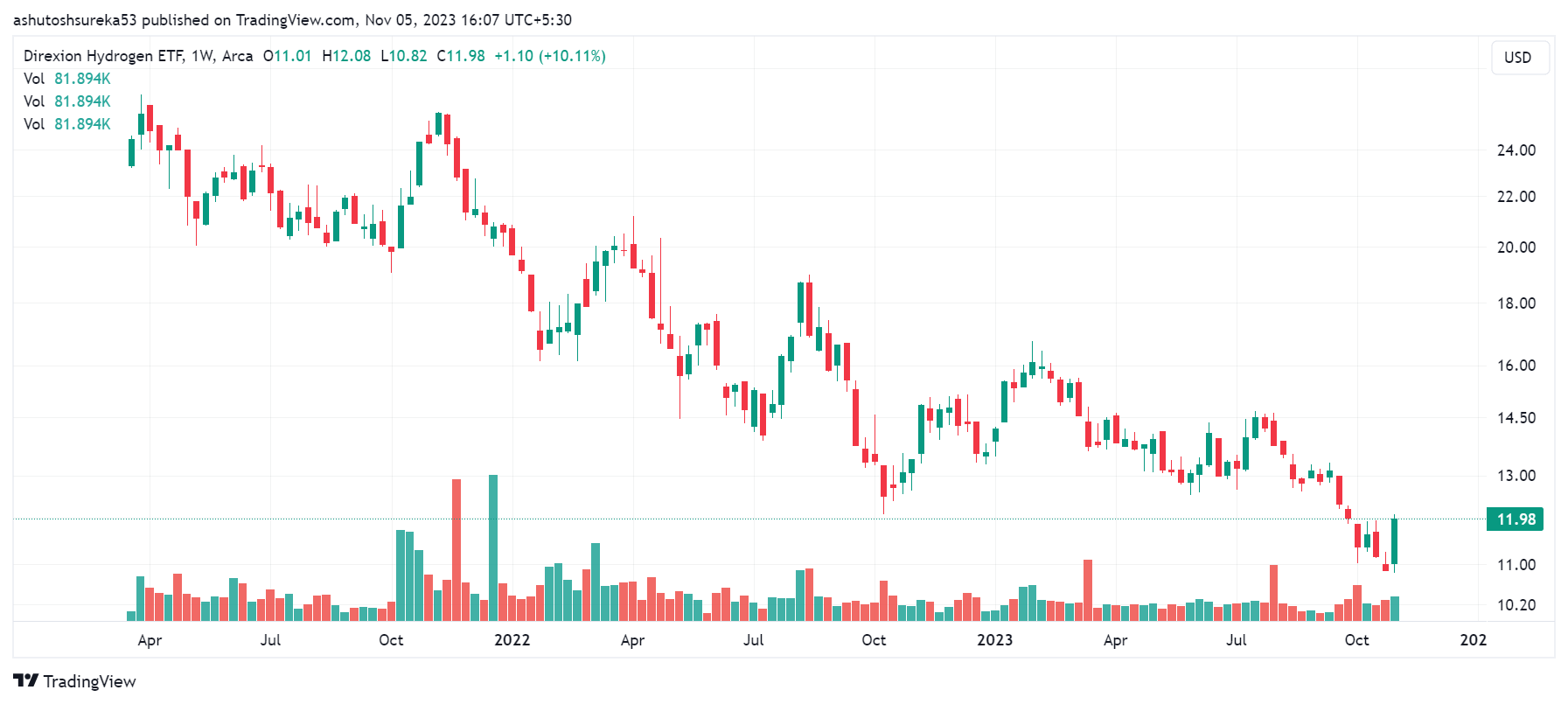
Expert insight: Direxion Hydrogen ETF reports net assets of $26.23M, a NAV of 11.36, and operates with a net expense ratio of 0.45%. Though the price trend has been on a continuous downtrend since inception, the prospects of the industry must be considered to take a comprehensive view of the ETF
| Sr. No. | Components | Weights |
|---|---|---|
|
1 |
Nel Asa |
8.77% |
|
2 |
Air Liquide |
8.28% |
|
3 |
Ballard Power Systems Inc. |
8.22% |
|
4 |
Plug Power Inc. |
8.19% |
|
5 |
Bloom Energy Corporation |
7.35% |
|
6 |
FuelCell Energy, Inc. |
4.64% |
|
7 |
Linde plc |
4.61% |
|
8 |
Air Products and Chemicals, Inc. |
4.56% |
|
9 |
JXTG Holdings Inc |
4.44% |
|
10 |
Shell plc |
4.42% |
|
11 |
Doosan Fuel Cell Co Ltd |
4.36% |
|
12 |
China Petroleum & Chemical Corp. |
4.30% |
|
13 |
BP p.l.c. |
4.09% |
|
14 |
ITM Power PLC |
3.85% |
|
15 |
Others (16 constituents) |
20.07% |
This ETF provides investors with exposure to five key sub-themes within the hydrogen industry, namely hydrogen production and generation, hydrogen production and storage, fuel cell and battery technologies, hydrogen systems and solutions, as well as membrane and catalyst innovations. Effectively, it offers a diversified investment approach allowing individuals to participate in various segments of the hydrogen sector.
Defiance Next Gen H2 ETF (Ticker: HDRO)
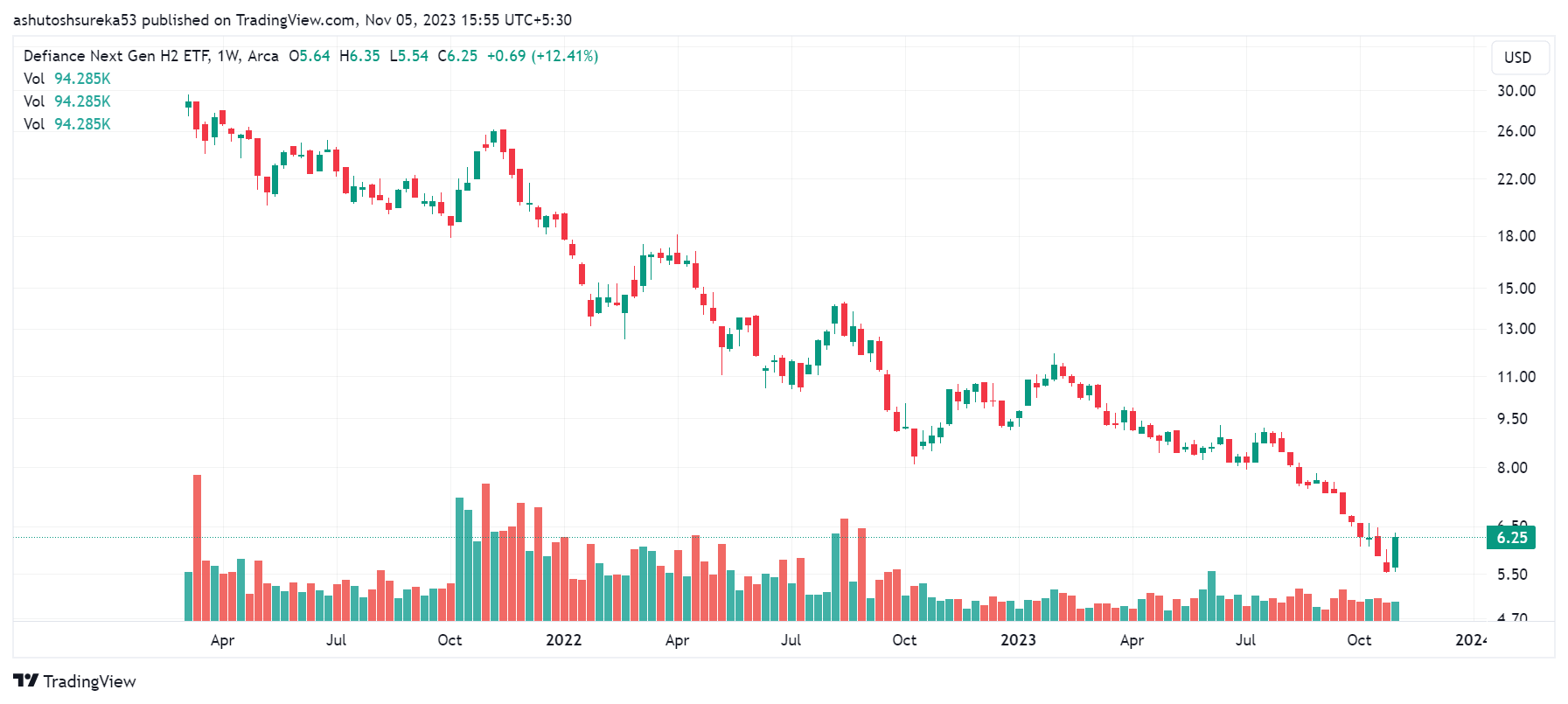
Expert insight: HDRO Fund reports net assets of $22.62M, a NAV of 6.01, and an expense ratio of 0.30%.Though the price trend has been on a continuous downtrend since inception, the prospects of the industry must be considered to take a comprehensive view of the ETF.
| Sr. No. | Components | Weights |
|---|---|---|
|
1 |
Plug Power Inc |
9.02% |
|
2 |
Ballard Pwr Sys Inc New |
8.96% |
|
3 |
Nel Asa |
8.18% |
|
4 |
Bloom Energy Corp |
7.60% |
|
5 |
Doosan Fuel Cell |
7.30% |
|
6 |
Linde Plc |
4.99% |
|
7 |
Air Prods & Chems Inc |
4.87% |
|
8 |
Fuelcell Energy Inc |
4.86% |
|
9 |
Air Liquide Sa |
4.84% |
|
10 |
Iljin Hysolus Co L |
4.60% |
|
11 |
Itm Power |
4.45% |
|
12 |
Thyssenkrupp Nucer |
3.96% |
|
13 |
Ceres Power Hldgs |
3.59% |
|
14 |
Powercell Sweden |
3.14% |
|
15 |
Others (12 constituents) |
19.65% |
This ETF tracks BlueStar Global Hydrogen & Next Gen Fuel Cell Index. It is a rules-based index and monitors the performance of publicly traded companies. These companies derive a minimum of 50% of their revenue from activities related to the development of hydrogen-based energy sources, fuel cell technologies, and industrial gases. This ETF truly diversifies across the companies as the companies are weighted, with a maximum of 10% for any single stock (4% for industrial gas stocks).
Invesco Hydrogen Economy UCITS ETF (Ticker: HYDE)
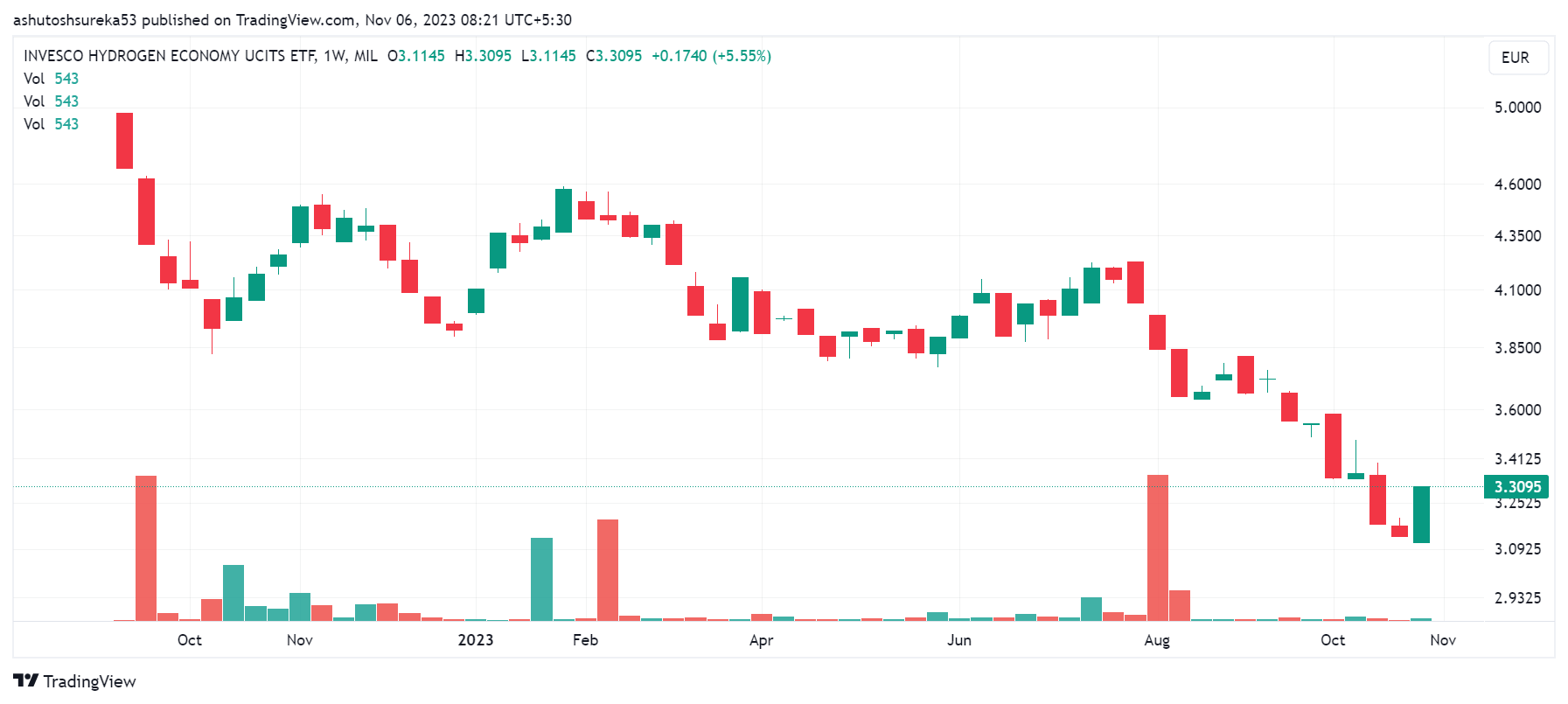
Expert insight: Invesco Hydrogen Economy UCITS ETF showcases a net asset value (NAV) of 285.0339 and total assets amounting to 2.1160 million USD. It operates with a total expense ratio of 0.60% p.a. Though the price trend has been on a continuous downtrend since inception, the prospects of the industry must be considered to take a comprehensive view of the ETF.
| Sr. No. | Components | Weights |
|---|---|---|
|
1 |
Weichai Power Co Ltd-H Hkd 1.0000 |
2.75% |
|
2 |
Nfi Group Inc Npv |
2.35% |
|
3 |
Furuya Metal Co Ltd Npv |
2.32% |
|
4 |
Greenvolt-Energias Renovavei Eur Npv |
2.20% |
|
5 |
Corp Acciona Energias Renova Eur Npv |
2.15% |
|
6 |
Arcadis Nv Eur0.02 |
2.09% |
|
7 |
Skf Ab-B Shares Sek2.5 |
2.09% |
|
8 |
Lotte Fine Chemical Co Ltd Krw5000 |
2.08% |
|
9 |
Neste Oyj Npv |
2.08% |
|
10 |
Te Connectivity Ltd Chf0.57 |
2.07% |
|
11 |
Toray Industries Inc Npv |
2.05% |
|
12 |
Varta Ag Npv |
2.02% |
|
13 |
Spie Sa Eur0.47 |
2.02% |
|
14 |
Takaoka Toko Co Ltd Npv |
2.01% |
|
15 |
Others (42 constituents) |
69.71% |
This ETF replicates the WilderHill Hydrogen Economy Index, which aims to track the progress of companies that are in the business of developing innovative technologies related to hydrogen, fuel cells, and the potential hydrogen economy. It achieves this by assigning equal weight to each security in the index with a small margin for overweighting and underweighting certain companies. It undergoes rebalancing on a quarterly basis which makes it a better candidate against ETFs which do annual rebalancing.
What sets it apart from other ETFs on the list is that it is invested in 55+ constituents, offering the broadest diversification prospects to the investors.
Best Stock brokers
Comprehensive Analysis: Word of the experts
By looking at the graphs provided above, it is clear that the entire industry is currently facing a downtrend. This is primarily due to the existing lack of infrastructure, technology adaptation and high costs associated with this industry. However, past returns do not dictate future returns, and in the coming years, as these shortcomings will be dealt with, these ETFs are likely to reverse their trend.
Another reason for their underperformance is lack of options. If you analyse the constituents of these funds, you will find plenty of companies common in every ETF. This is discouraging, as these funds are not truly differentiated. As this industry will gain traction, more and more companies will join, and then these ETFs will have plenty of options to choose from.
This also creates a viscous cycle, where investors are not pumping in money as the industry currently at its nascent stage, and as a result, it doesn’t get the required capital to flourish, which in turn disincentivizes the investors. But this cycle can be easily broken once everyone starts to see that their future will revolve around cleaner and sustainable sources of energy.
How to choose Hydrogen ETFs
To analyse hydrogen ETFs effectively, an investor must judge them with these points in mind
Industry Exposure
Look for ETFs that offer broad exposure to the hydrogen industry. Consider whether the ETF includes companies involved in hydrogen production, storage, transportation, fuel cell technology, or related sectors.
Expense Ratios
Pay attention to the ETF's expense ratio, which represents the annual fees charged by the fund. Lower expense ratios can lead to higher returns over time. Compare expense ratios among different ETF options.
Historical Performance
Past performance doesn't guarantee future results, but reviewing an ETF's historical performance can provide insights into how it has reacted to market conditions and whether it aligns with your investment goals or not.
Liquidity
Ensure that the ETF has reasonable liquidity, meaning there is adequate trading volume and tight bid-ask spreads. High liquidity can help you buy and sell shares at competitive prices.
Assets Under Management
A larger AUM typically indicates greater investor interest and confidence in the ETF. However, it's essential to balance AUM with other factors as a higher AUM doesn't always translate to better performance.
Is Investing in Hydrogen ETFs a Smart Move?
Investing in Hydrogen ETFs can be a smart move but it's crucial to weigh the potential benefits and risks, especially given the current state of the hydrogen industry. Here's a balanced perspective by the experts.
Potential Benefits
Green Energy Growth
Hydrogen is hailed as a clean energy solution with diverse applications, including transportation and industrial processes. As countries strive to reduce carbon emissions, the hydrogen sector's growth potential is significant. As per PRNewswire, the global hydrogen generation market is estimated to grow from USD 158.8 billion in 2023 to USD 257.9 billion by 2028. It is expected to record a CAGR of 10.2% during this period. Maybe, you can also be interested in information about the best carbon capture technology stocks.
Diversification
Hydrogen ETFs provide diversification by including companies across the hydrogen value chain. This diversification can help spread risk and reduce the impact of poor-performing stocks. But one should be mindful of not over allocating it for the sake of better diversification as it may lead to a lop-sided portfolio. Somewhere around 5-8% of hydrogen holding can be considered as healthy diversification.
Exposure to Innovation
Investing in hydrogen ETFs offers exposure to companies engaged in cutting-edge technologies for hydrogen production, storage, and transportation. This can be an opportunity to benefit from technological advancements.
Long-Term Sustainability
With the global push for sustainability and renewable energy, the hydrogen sector aligns with long-term investment goals and the transition to greener energy sources. Today, many profitable companies are now getting negatively screened by ESG criteria and hydrogen sector can provide a long-term sustainable angle to one’s portfolio.
Potential Risks
Market Volatility
The hydrogen industry is known for its volatility, influenced by factors like government policies, infrastructure development, and energy trends. Investments in this sector can be subject to significant price swings. Therefore, it is advisable to keep its allocation to the modest levels for avoiding its volatility.
Regulatory and Policy Risks
Changes in regulations or shifts in government support can impact the sector's growth and profitability. Also, hydrogen industry is highly capital intensive in nature which makes it more dependent on the regulatory policies of the government.
Industry Maturity
The hydrogen industry is still in its infancy compared to other energy sectors. Only the early adaptors are experimenting in this industry. This can present challenges and uncertainties for investors as it has not proven its track record.
Tips for Beginners – How to Invest in Hydrogen ETFs
For beginners looking to invest in Hydrogen ETFs, here are some expert tips to help you get started and build a diversified portfolio.
-
Before you start investing, take the time to understand the hydrogen industry and how ETFs work. Explore resources, read expert analyses, and stay updated on market trends.
-
Clarify your financial objectives, risk tolerance, and investment horizon. Knowing your goals will guide your ETF selection and investment strategy. You can also opt for goal-based investing strategies.
-
Diversification is key to managing risk. While hydrogen ETFs can be a part of your portfolio, avoid putting all your investments in this sector. A diversified portfolio includes various asset classes, such as stocks, bonds, and real estate, to spread risk.
-
Start with a small investment. This approach allows you to learn without risking a significant portion of your capital.
-
Select hydrogen ETFs that align with your investment goals. Look for low expense ratios and consider funds with a broad range of holdings in the hydrogen industry.
-
Instead of investing a lump sum, consider using a dollar-cost averaging strategy. Invest a fixed amount at regular intervals which can help reduce the impact of market volatility.
-
Keep a watchful eye on your investments. Regularly review your portfolio's performance and make adjustments as needed to stay on track with your goals.
-
If your chosen ETFs offer dividends, consider reinvesting them to harness the power of compound growth.
-
Investing in hydrogen ETFs is typically a long-term endeavor. Avoid making impulsive decisions based on short-term market fluctuations.
Risks and Challenges of Hydrogen industry
Investing in the hydrogen industry presents numerous opportunities but it also comes with several risks and challenges that investors should be aware of.
High Initial Costs
Hydrogen technology, including production, storage, and transportation, often requires substantial upfront investments. For companies involved in hydrogen production, building and maintaining the necessary infrastructure can be costly. This cost can impact the profitability of companies operating in this sector.
Competitive Pressures
The hydrogen industry is growing rapidly and it is becoming increasingly competitive. Companies face the challenge of staying ahead in terms of technological innovation and cost efficiency. Intense competition can exert pressure on profit margins.
Energy Source Dependency
The production of hydrogen often relies on specific energy sources, such as natural gas or renewable energy. Fluctuations in the availability and price of these energy sources can impact the hydrogen production process.
Infrastructure Challenges
Developing a robust hydrogen infrastructure, including transportation and storage, is a complex and costly business. The lack of adequate infrastructure can hinder the industry's growth as it is highly capital-intensive industry.
Market Demand and Consumer Adoption
The success of the hydrogen industry depends on market demand and consumer adoption. It can pose challenges for companies and investors if the market for hydrogen-based products and technologies grows slower than expected.
Geopolitical Factors
Geopolitical tensions or global events can influence the hydrogen market. For example, disruptions in the supply chain or international relations can impact the industry's stability and profitability which was recently experienced during the Russia-Ukraine war.
FAQs
What are hydrogen ETFs, and how do they differ from individual stocks?
Hydrogen ETFs offer diversified exposure to multiple companies in the hydrogen industry while individual stocks represent ownership in a single company involved in hydrogen-related activities. Investing in hydrogen ETFs provides portfolio diversification which spreads the risk across various companies. Individual stocks carry the risk associated with a single company's performance.
How can I choose the best hydrogen ETFs for my investment portfolio?
To select the best hydrogen ETFs, consider factors like industry exposure, expense ratios, historical performance, and your investment goals to align with your overall portfolio strategy. Evaluating these criteria can help you make informed choices.
Is investing in hydrogen ETFs a good strategy for long-term growth?
Investing in hydrogen ETFs can be a smart long-term strategy as the hydrogen industry is expected to grow. But like all investments, it carries inherent risks that should be carefully assessed. Diversifying your portfolio can help mitigate these risks.
What are the potential risks of investing in hydrogen ETFs?
The potential risks of investing in hydrogen ETFs include market volatility and uncertainties in the hydrogen industry's growth, as well as regulatory changes impacting the sector.
Glossary for novice traders
-
1
Broker
A broker is a legal entity or individual that performs as an intermediary when making trades in the financial markets. Private investors cannot trade without a broker, since only brokers can execute trades on the exchanges.
-
2
Index
Index in trading is the measure of the performance of a group of stocks, which can include the assets and securities in it.
-
3
Investor
An investor is an individual, who invests money in an asset with the expectation that its value would appreciate in the future. The asset can be anything, including a bond, debenture, mutual fund, equity, gold, silver, exchange-traded funds (ETFs), and real-estate property.
-
4
Trading
Trading involves the act of buying and selling financial assets like stocks, currencies, or commodities with the intention of profiting from market price fluctuations. Traders employ various strategies, analysis techniques, and risk management practices to make informed decisions and optimize their chances of success in the financial markets.
-
5
Diversification
Diversification is an investment strategy that involves spreading investments across different asset classes, industries, and geographic regions to reduce overall risk.
Team that worked on the article
Vuk stands at the forefront of financial journalism, blending over six years of crypto investing experience with profound insights gained from navigating two bull/bear cycles. A dedicated content writer, Vuk has contributed to a myriad of publications and projects. His journey from an English language graduate to a sought-after voice in finance reflects his passion for demystifying complex financial concepts, making him a helpful guide for both newcomers and seasoned investors.
Dr. BJ Johnson is a PhD in English Language and an editor with over 15 years of experience. He earned his degree in English Language in the U.S and the UK. In 2020, Dr. Johnson joined the Traders Union team. Since then, he has created over 100 exclusive articles and edited over 300 articles of other authors.
Mirjan Hipolito is a journalist and news editor at Traders Union. She is an expert crypto writer with five years of experience in the financial markets. Her specialties are daily market news, price predictions, and Initial Coin Offerings (ICO).





